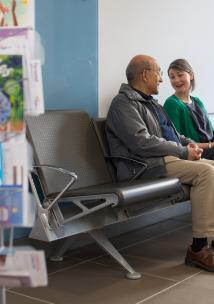Dementia Report - May 2016

Summary
Caring well for those with dementia is a high national, international and local priority and especially so in Rutland where numbers of elderly are rising so rapidly. Locally we have many excellent services but there are also gaps. We wanted to hear users' and carers' experiences but this report also draws on the valuable insight of about 300 carers, professionals, voluntary organisations and planners. We looked at services with the people who both use and those who provide them and describe here what they said and we continue to listen to people's experiences.
This interim report was prepared for commissioners who are developing new services including the Better Care Together Programme. We hope it will be helpful.
Key findings:
Key messages for each of ten stages of dementia care for Rutland people:
- Deciding to seek a diagnosis - More could be done by organisations working together across the whole community to raise awareness of memory loss in Rutland and dispel the stigma and fear of "dementia".
- Going to the GP for help - GPs would welcome help to support families to come forward to seek a diagnosis. The Rutland diagnosis rate is still below target.
- Getting a diagnosis - There is lack of clarity about the many routes people can take to obtain a diagnosis. The system feels slow, cumbersome and confusing to those in it.
- Getting treatment - Those getting treatment also found the system confusing and fragmented.
- Information - Getting the right information tailored to each stage is very important but does not happen.
- Support at home after starting treatment (clinical and social) - People feel that system of care coordinators is needed to help those less able to find their way around such a complex mix of statutory, voluntary and commercial services. Linking these services in a more cohesive way is now being addressed and is vital.
- Care homes and domiciliary care - Relatives struggle to find residential and domiciliary care of suitable quality. They feel this shortage will get worse as demand rises and if new services are not provided.
- Short breaks - Carers value respite care and short breaks but it can be stressful for all concerned. Carers would like more flexibility both in the packages on offer and financial arrangements.
- Hospital - Hospital admission is best minimised for those with dementia but remains the largest source of referral for diagnosis. Considerable improvements have been initiated with government funding in surrounding hospitals and need to be evaluated. People in Rutland attend many different hospitals and the problems of delayed and inappropriate discharges continue to bedevil us.
- End of life - We will be looking at end of life care for all people and have not yet undertaken this critical work.

